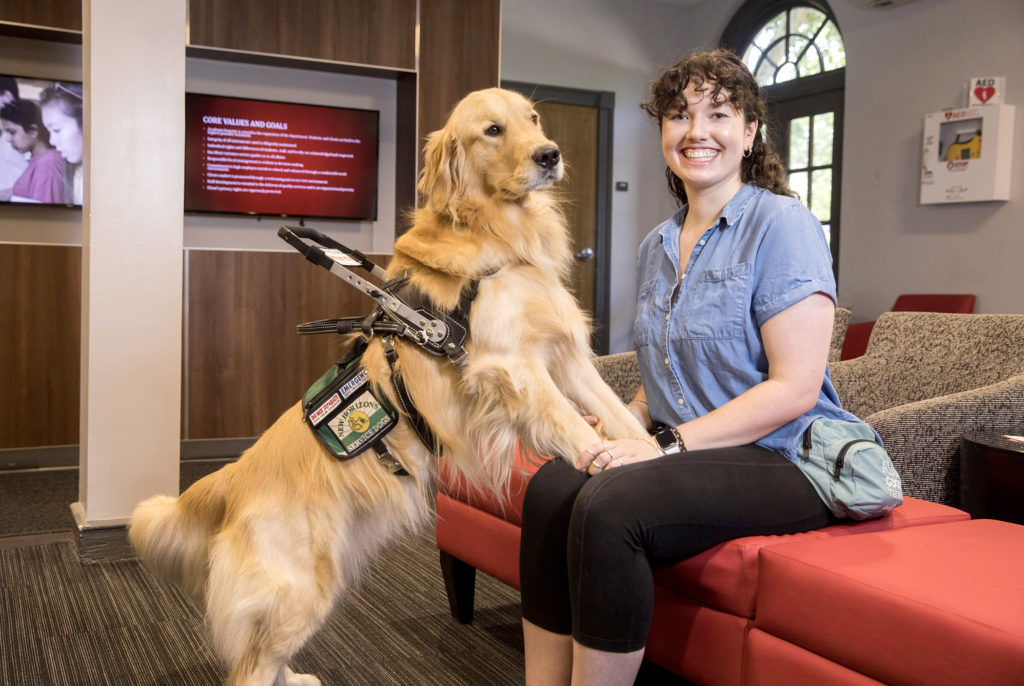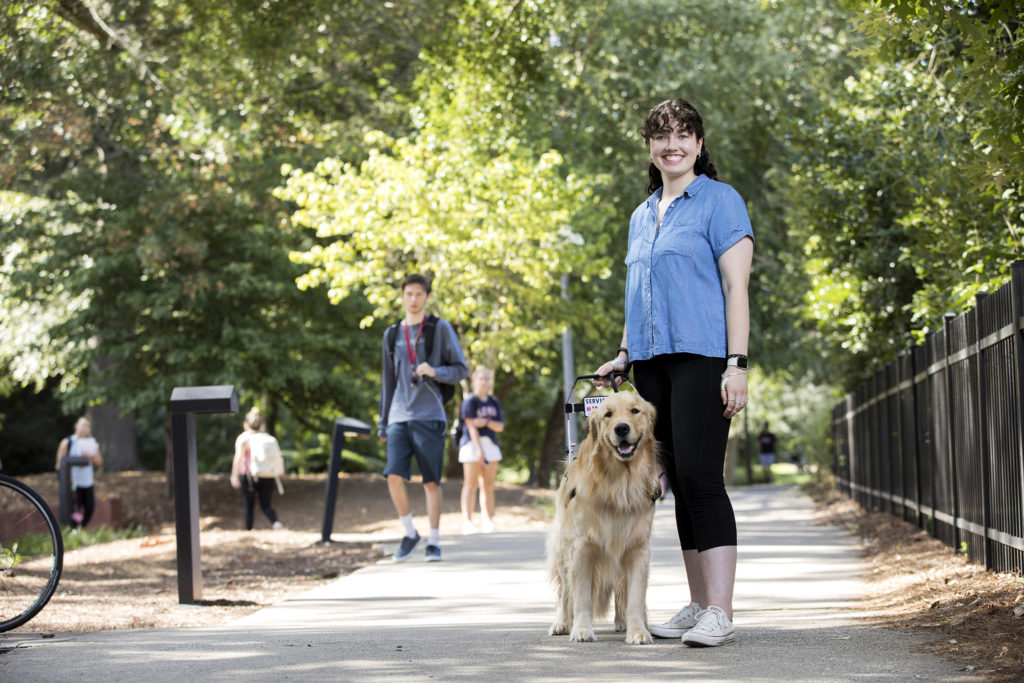Tyler Burrell is on a mission to teach others about “invisible illness”—that not all people who look normal are able-bodied and healthy.
“That person needing the elevator for one floor, the person with a handicap pass who looks totally healthy, might not be,” she said. “You never know someone’s whole story.”
Burrell, a University of Georgia senior international affairs and communication studies major, is part of the Disability Resource Center’s Speaker’s Bureau. She has talked to a First-Year Odyssey class and new graduate teaching assistants about how to help students with accommodations for disabilities. There, people are able ask questions in an open, comfortable environment and have a discussion about disabilities. “The goal is people gaining knowledge and increasing awareness, especially for invisible illness in general,” she said.
“We have people with so many disabilities, a huge variety: deaf, learning disabilities. I would encourage people to ask questions, to learn. This makes for a community that is more understanding and compassionate,” she said.
Burrell, who has Ehlers-Danlos Syndrome, is very open about her disability. “A lot of people have so many questions and think it would be rude to ask,” she said. “I would rather you come up and ask a question than stare and wonder what’s wrong. I have no problem answering questions.”
Burrell’s condition is a genetic disorder that affects the connective tissue and collagen in her body. Her joints spontaneously dislocate, and she has chronic pain. She also has Postural Orthostatic Tachycardia Syndrome, which can cause fainting, and Gastroparesis, or partial stomach paralysis. Her body doesn’t regulate temperature correctly, and she has a higher heart rate and lower blood pressure. So, she’s prone to fainting and has had a feeding tube in the past. Now, her symptoms are well controlled.
Her symptoms started around her 16th birthday. She was a competitive swimmer, and her joints would dislocate and she’d tire easily. She gave up swimming, and in 2015 enrolled at UGA.
“My first year of college was pretty good. My second year, I dragged myself over the finish line and then had to take medical leave.”
Initially, it was one semester off. That became one year in order to get her symptoms under control.
“For a short time, I wondered if I would be able to graduate at all.”
Help around campus
She came back to school in 2018 after medical leave. Her friend had a service dog, Rollo, and Burrell started researching whether a service dog could help her remain independent. She grew up with dogs and thought the idea had potential.
And after being on the wait list for a year, she got her service dog, Scorpio, in March. He’s a mobility assistance dog that can help her with balance, can carry things for her and even throw out trash. He stays with her when she faints and he knows Deep Pressure Therapy to help reduce her pain. He’s a constant companion, devoted to helping to her.
Scorpio is also distractingly cute and fluffy.
Thankfully, with the amount of guide-dogs-in-training on the UGA campus, most of the campus community knows service dog etiquette and not to pet or distract a working dog on duty.
Burrell is also a part-time wheelchair user, depending on the day. She uses a wheelchair for traveling longer distances. For shorter distances, she can use a walker. She also walks with mobility support from Scorpio. She holds on to his harness and he helps balance her. “He really has extended my walking and standing by a lot.”
She also uses ring splints, which look like trendy silver jewelry, on her fingers and thumb that help her joints stay in the proper place.
Campus resources
Coming to UGA wasn’t always the plan for Burrell.
“I actually did not have any intention of attending UGA until I humored my mother with a campus tour and fell in love with the school,” she said. “I wasn’t sure what I wanted to major in or what I wanted to do with my life, but I knew that UGA had the resources to support whatever I ended up choosing to do. At the end of the day, UGA is a big school with a ton of resources at its disposal, and I wanted to take advantage of those resources.”
Burrell uses the campus paratransit van service that drops her off close to her classes. “The drivers are amazing, so nice. They can pull right up to the Miller Learning Center. They can pull up almost to the door of Caldwell.”
She encourages anyone curious about accommodations to reach out to the Disability Resource Center. “So many students suffer needlessly,” she said. “They don’t think about the Disability Resource Center. They think they’re not disabled enough, or are nervous to reach out and take that step. It can make a huge difference.”
The center can help with note takers, extra time on tests, recording lectures, and large format print for exams.
For her, accommodations might mean a different desk that she can use a wheelchair with or having access to food and drink in class.
For essays, she can’t write for long periods of time because of her joints, so she types her essay tests.
“My professors have been so accommodating and kind. I talk to every professor at the beginning of the semester. I need to introduce myself and we try to work out a plan. It varies a little class to class,” she said. “I’ve been so fortunate. Every single one of my professors have been accommodating and kind. SPIA and the communications department have been phenomenal and understanding.”
What’s next
Burrell is considering graduate school after she graduates in December. Her long-term goal is to work in intelligence analysis or global security. She was inspired in part by her father.
“My dad has worked for the government for as long as I’ve been alive, so I got glimpses into the world of security while growing up. When I came to UGA and took my first international affairs class I knew I was hooked, and I’ve gravitated towards intelligence due to personal interest guided by the classes I’ve taken.”
For now, though, she takes things one day at time. And her illness has taught her to “be more compassionate, more caring and understanding.”
To read more on Scorpio, click here.

